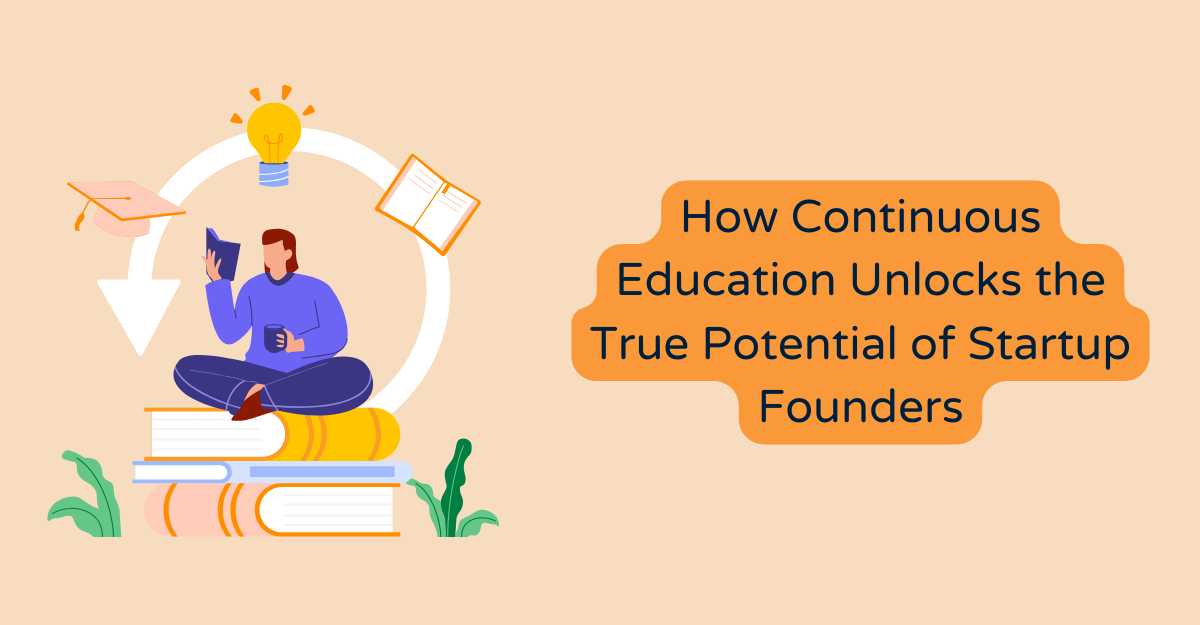
In the dynamic landscape of entrepreneurship, where innovation and adaptability are key, startup founders face multifaceted challenges. Continuous education emerges as an indispensable tool to navigate this complex terrain successfully.
Cultivating a mindset of perpetual learning not only fortifies founders with the latest knowledge but also cultivates the essential skills needed for sustainable success. In this article, we will dive into the crucial role continuous education plays in unlocking the true potential of startup founders.
Knowledge Expansion
Startup founders who recognize the importance of continuous knowledge expansion position their ventures for accelerated growth. In an ever-evolving business landscape, staying ahead of the curve requires a deep understanding of industry trends, market dynamics, and emerging technologies.
Continuous education becomes the catalyst that propels founders beyond their comfort zones and into the world of strategic decision-making. By investing time in targeted educational pursuits, founders gain a comprehensive perspective on their industry’s intricacies.
This broadened knowledge base enables them to make well-informed choices, navigate market shifts, and seize opportunities that might otherwise go unnoticed. From understanding customer behavior to keeping abreast of global economic trends, founders with expansive knowledge are better equipped to steer their startups toward growth.
Adapting to Evolving Demands
The dynamic nature of startup environments demands constant skill enhancement from founders. Beyond the initial set of skills that led to the establishment of their ventures, founders must evolve alongside the ever-changing demands of their industries. Forbes highlights that companies such as Blockbuster, Blackberry, and Bed Bath & Beyond faced a downfall as a result of their failure to adapt.
Continuous education acts as a dynamic toolkit, allowing founders to adapt and thrive in the face of new challenges. Through ongoing skill development, founders can embrace emerging technologies, refine leadership styles, and enhance their problem-solving capabilities.
A commitment to continuous learning ensures that founders remain versatile and ready to tackle the evolving demands of their roles. Founders who prioritize skill enhancement not only future-proof their startups but also cultivate a culture of innovation within their teams.
By setting an example of continual self-improvement, they inspire employees to embrace the same ethos, creating a collaborative environment that fosters creativity and adaptability.
Resilience Building
The entrepreneurial journey is fraught with uncertainties and challenges. For startup founders, the ability to navigate setbacks with resilience is a critical component of long-term success.
McKinsey & Company states that businesses that prioritize developing resilient operations, teams, and leaders could potentially gain a dual talent advantage. Such adaptable environments are more likely to attract top talent, increasing their chances of success. In turn, these successful individuals are more likely to perpetuate a cycle of resilience within the organization.
Continuous education serves as a resilience-building tool by instilling founders with the skills and mindset needed to overcome obstacles.
Through ongoing learning, founders develop problem-solving skills and learn to extract valuable lessons from failures. This iterative process not only builds resilience but also transforms challenges into opportunities for growth. The capacity to face adversity with confidence is a distinguishing factor that sets successful founders apart.
Furthermore, continuous education provides founders with insights into the experiences of other entrepreneurs who have overcome similar challenges. This shared wisdom creates a supportive community where founders can exchange ideas, seek advice, and draw inspiration from each other’s journeys. The resulting network becomes a valuable asset, reinforcing the resilience of founders and their startups.
The Power of Learning from Peers
In the world of entrepreneurship, networking is more than just a social activity – it’s a powerful avenue for continuous learning. Founders who actively engage in building networks within their industries create opportunities to learn from the experiences and insights of their peers.
As per Indeed, peer-to-peer yearning can be thought of as a training program where members of a workforce learn from one another. Colleagues at the same level or within the same department share their knowledge and experiences, fostering collaboration. This approach, commonly used in education, seamlessly translates into workplace practices, capitalizing on shared insights among colleagues.
Networking enables founders to gain a firsthand understanding of market trends, industry best practices, and innovative approaches to common challenges. Conversations with fellow entrepreneurs provide valuable perspectives that can influence strategic decision-making and inspire fresh ideas.
This collective knowledge-sharing contributes to the growth and development of both individual founders and the broader startup ecosystem.
Moreover, networking goes beyond the exchange of information – it fosters collaboration and partnerships. Founders who cultivate strong professional relationships within their networks often discover new pathways for collaboration, joint ventures, or mutually beneficial business partnerships.
Transformative Ideas
Innovation lies at the heart of successful startups, and continuous education serves as a catalyst for transformative ideas. Founders who commit to ongoing learning are more likely to push the boundaries, leading their startups to pioneer breakthroughs within their industries.
Continuous education stimulates creative thinking by exposing founders to diverse perspectives, cutting-edge technologies, and emerging trends. This influx of new information becomes the raw material for innovation, inspiring founders to question existing norms and seek novel solutions to complex problems.
It encourages a culture of curiosity and experimentation within the startup, fostering an environment where groundbreaking ideas can thrive. Additionally, learning from the successes and failures of other innovators, both historical and contemporary, provides founders with valuable insights.
By studying the trajectories of renowned entrepreneurs, founders can identify patterns, anticipate challenges, and draw inspiration for their own inventive pursuits. The synergy between continuous education and innovation transforms startups from followers to trailblazers, positioning them as drivers of change within their respective industries.
Online Programs for Ongoing Learning
In the digital age, online education programs have emerged as a flexible and accessible means for startup founders to pursue ongoing learning. These programs offer a diverse range of courses, workshops, and degree programs tailored to the specific needs and constraints of busy entrepreneurs.
Online platforms provide founders with the flexibility to learn at their own pace, fitting education into their demanding schedules.
According to Marymount University, one noteworthy avenue for startup founders is pursuing a Doctor of Business Administration (DBA). This advanced business degree provides a comprehensive and specialized curriculum designed for seasoned entrepreneurs aiming to elevate their leadership and strategic management skills.
A DBA online business degree covers a broad spectrum of topics relevant to startup success, including advanced business analytics, strategic decision-making, and organizational leadership. The flexibility of online learning allows founders to balance their educational pursuits with the demands of running a startup. This makes it a viable option for those with busy schedules.
A Journey Toward Long-term Success
The pursuit of long-term success in the startup world is a continuous journey, not a static destination. Founders who embrace the philosophy of lifelong learning position themselves and their startups for sustained growth and relevance.
Continuous education ensures that founders remain adaptable to the ever-changing business landscape.
By staying informed about industry trends, technological advancements, and evolving consumer behaviors, founders can proactively adjust their strategies to stay ahead of the competition. This forward-thinking approach becomes a cornerstone for long-term success, preventing startups from becoming obsolete in the face of rapid change.
Furthermore, the commitment to ongoing learning instills a culture of curiosity and improvement within the startup. When founders prioritize education, they set an example for their teams, fostering an environment where continuous improvement is celebrated. This, in turn, attracts top talent, as individuals are drawn to organizations that value personal and professional development.
In essence, continuous education is the cornerstone for startup founders seeking enduring success. It equips them with the knowledge and adaptability crucial for navigating the dynamic business landscape. Beyond skill enhancement, it fosters resilience, encourages collaborative learning from peers, and sparks transformative ideas.
The integration of online programs further amplifies accessibility. By embodying a commitment to lifelong learning, founders ensure their startups stay ahead of industry shifts while cultivating a culture of innovation. This commitment attracts top talent while positioning startups as agile, forward-thinking entities capable of leading and shaping the future of their respective industries.

